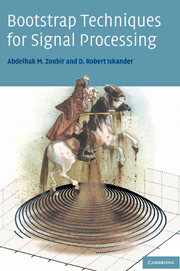3 - Signal detection with the bootstrap
Published online by Cambridge University Press: 03 December 2009
Summary
Detection of signals in interference is a key area in signal processing applications such as radar, sonar and telecommunications. The theory of signal detection has been extensively covered in the literature. Many textbooks exist, including the classic by Van Trees (2001a) and his later additions to the series (Van Trees, 2001b, 2002a,b), the text on radar detection by DiFranco and Rubin (1980), and several texts on estimation and detection (Scharf, 1991; Poor, 1994; Kay, 1993, 1998). Signal detection theory is well established when the interference is Gaussian. However, methods for detection in the non-Gaussian case are often cumbersome and in many cases non-optimal.
Signal detection is formulated as a test of a hypothesis (Lehmann, 1991). To cover signal detection, we first need to introduce some concepts of hypothesis testing. This is followed by an exposition of bootstrap based hypothesis testing. In the second part of the chapter, we provide details on bootstrap detection of signals in Gaussian and non-Gaussian noise and show how bootstrap detection alleviates the restrictions imposed by classical detectors.
Principles of hypothesis testing
As the term suggests, in hypothesis testing one wishes to decide whether or not some formulated hypothesis is correct. The choice is between two decisions: accepting or rejecting the hypothesis.
Information
- Type
- Chapter
- Information
- Bootstrap Techniques for Signal Processing , pp. 62 - 102Publisher: Cambridge University PressPrint publication year: 2004
